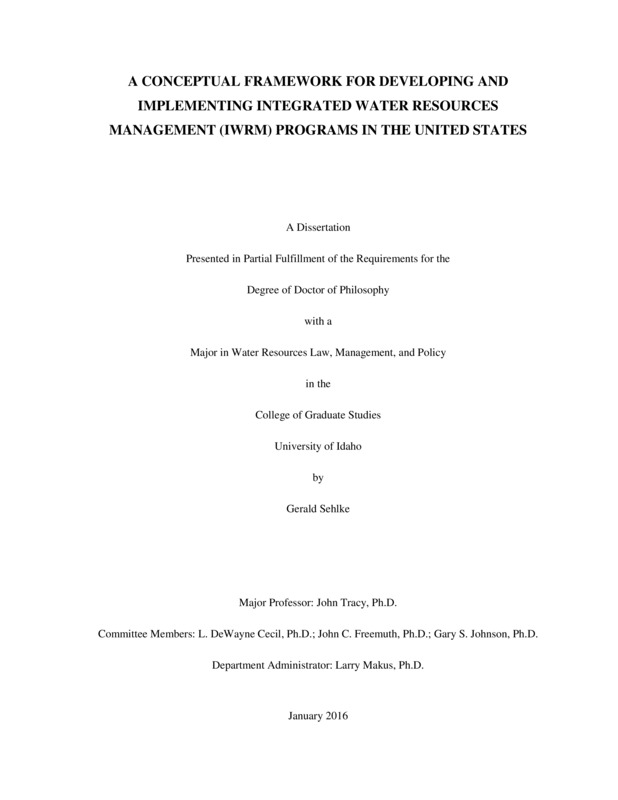A CONCEPTUAL FRAMEWORK FOR DEVELOPING AND IMPLEMENTING INTEGRATED WATER RESOURCES MANAGEMENT (IWRM) PROGRAMS IN THE UNITED STATES
Sehlke, Gerald. (2016). A CONCEPTUAL FRAMEWORK FOR DEVELOPING AND IMPLEMENTING INTEGRATED WATER RESOURCES MANAGEMENT (IWRM) PROGRAMS IN THE UNITED STATES. Theses and Dissertations Collection, University of Idaho Library Digital Collections. https://www.lib.uidaho.edu/digital/etd/items/sehlke_idaho_0089e_10802.html
- Title:
- A CONCEPTUAL FRAMEWORK FOR DEVELOPING AND IMPLEMENTING INTEGRATED WATER RESOURCES MANAGEMENT (IWRM) PROGRAMS IN THE UNITED STATES
- Author:
- Sehlke, Gerald
- Date:
- 2016
- Embargo Remove Date:
- 2016-11-12
- Keywords:
- Adaptive Managment Integrated Water Resources Management IWRM Water Law Water Management Water Policy
- Program:
- Water Resources
- Subject Category:
- Water resources management; Hydrologic sciences; Natural resource management
- Abstract:
-
The United States (U.S.) is a resource-rich nation and the development of our water and water-related resources has created great socioeconomic stability and allowed Americans to prosper for more than 200 years. However, development of these resources has not been without its attendant costs. Global change has impacted virtually every river basin in the U.S., often degrading the quality and availability of water and water-related resources.
The concept of Integrated Water Resources Management (IWRM) has evolved over approximately the past 50 years and it was formally accepted internationally as part of Agenda 21 in 1992. IWRM provides a holistic, systematic, and integrated framework that promotes the sustainable development and management of water and water-related resources in order to maximize the economic and social welfare of humans without compromising the sustainability of the environment. IWRM was designed for world-wide applicability; it has been largely embraced by the international water resources community, but not by the U.S. water resources community. However, a growing number of U.S. organizations now believe that IWRM can significantly improve water resources management in the U.S. (e.g., AWRA 2011, AwwaRF 1998, and USACE 2010a). As demands for and conflicts over water and water-related resources continue to increase, it may be time for the U.S. water community to develop more holistic, systematic, and integrated policies, laws, methods, and tools to meet those growing demands and changing needs. IWRM may be the most appropriate next step for managing water and water-related resource needs in the U.S.
A few others have discussed conceptual models for implementing IWRM in the U.S. (e.g., Shabman and Scodari 2012). However, most IWRM-related research in the U.S. is focused on the implementation of project-level or watershed-level programs. This research focuses on developing a scientifically-based policy and legal framework to assist state, tribal and federal natural resource and environmental policy- and decision-makers refocus and/or modify their existing policies and laws with respect to implementing IWRM, where they deem it is appropriate and desirable to do so within their jurisdiction.
- Description:
- doctoral, Ph.D., Water Resources -- University of Idaho - College of Graduate Studies, 2016
- Major Professor:
- Tracy, John C
- Committee:
- Cecil, L. DeWayne; Freemuth, John C.; Johnson, Gary S.; Tracy, John C.
- Defense Date:
- 2016
- Identifier:
- Sehlke_idaho_0089E_10802
- Type:
- Text
- Format Original:
- Format:
- application/pdf
- Rights:
- In Copyright - Educational Use Permitted. For more information, please contact University of Idaho Library Special Collections and Archives Department at libspec@uidaho.edu.
- Standardized Rights:
- http://rightsstatements.org/vocab/InC-EDU/1.0/

